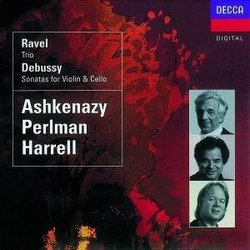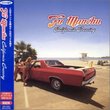| All Artists: Ravel, Debussy, Ashkenazy, Perlman, Harrell Title: Trio / Sonatas for Violin & Cello Members Wishing: 0 Total Copies: 0 Label: Polygram Records Release Date: 11/14/1995 Genre: Classical Styles: Chamber Music, Instruments, Strings Number of Discs: 1 SwapaCD Credits: 1 UPC: 028944431827 |
Search - Ravel, Debussy, Ashkenazy :: Trio / Sonatas for Violin & Cello
 | Ravel, Debussy, Ashkenazy Trio / Sonatas for Violin & Cello Genre: Classical
|
Larger Image |
CD DetailsSimilar CDs
|
CD ReviewsMORE THAN JUST OK DAVID BRYSON | Glossop Derbyshire England | 01/30/2007 (4 out of 5 stars) "From the point of view of 'quality' there is very little about this recital to criticise. Technically these players are top-notch, they show sensitivity as well as power and intellectual comprehension, they do nothing wilful or questionable, and the recorded sound they are given is very good. All the same, I would have liked a little more atmosphere and magic in a great deal of this music. I missed these factors especially in the first movement of the Ravel, but it is not until the final piece on the disc, Debussy's cello sonata, that the performance came somewhere close to how I like the thing ideally.
I have to confess that I often find Ashkenazy's playing, for all his tremendous endowment, just a little ordinary. That sense is with me here again, and it seems to have slightly infected Perlman as well. The recital opens with Ravel's wonderful trio, and in the right performance there is a real frisson about the cool and poised theme at the start. I have an elderly vinyl LP of the work played by the Trio di Trieste whose players, though easily proficient enough, are not quite in the same technical bracket as the three giants here, nor is their sound as recorded nearly as good as it is in this modern set. However as soon as they make a sound I start to detect the special effect I'm looking for, the sense of feyness that often goes along with Ravel's elegance and perfectionism. In welcome contrast to that, there is also a feeling of excitement in the main climaxes, both the one near the start and particularly when that pellucid opening theme returns with startling power and fullness of tone in the middle of the movement. By comparison, Ashkenazy Perlman and Harrell come across to me as very correct but just a bit worthy and earthbound. I suppose the contrast is less marked in the other three movements, particularly in the Pantoum, but even so there should be more of a feeling of mystery in the slow passecaille, and the last movement, after an effective start, goes the way of the first movement before very long. I liked the Debussy pieces rather better, but that could be partly because I'm more in tune temperamentally with Ravel than I am with Debussy, much as I revere him, and so probably fussier and harder to please. The violin sonata is very well done in all tangible respects, and again it's something intangible that I think I find lacking. If I say that I find it slightly literal, I don't imply that that it lacks poetry or beauty, just that in French music of this period there is something elusive that has eluded either the players or the listener in this instance. The cello sonata comes off best of the three offerings here, to my ears at least, and this has to be attributable in large part to the magnificence of Harrell's tone, especially his pizzicato tone. The recording, good as it is, probably has a certain amount to do with the way I react to this set. Both Debussy and Ravel rely for their effect in recording on very high quality engineering more than most composers do. Ironically, if the engineering is not to the highest modern standards (as on my LP of the Ravel trio) one's ear 'kicks in', so to speak, and supplies the deficiency imaginatively. When the engineering is almost but not quite up to the standard one hopes for in these composers the listener's imagination seems to stay in its kennel and refuse to play, and that may be happening here. What I don't believe is that it's a prerequisite for the performers to be French or even more generally 'Latin', although presumably it does no harm to be either. If you want to hear great renderings in superlative sound of music by these particular composers, just try the set of their string quartets from the Borodin Quartet and I'm sure you'll hear what I mean. This disc may not be easy to find by now, and I certainly would not wish to discourage anyone coming across it from taking it at the right price. Even on my view, these accounts of the three pieces will go a long way towards satisfying many listeners, and my view is far from being one that I would expect to be universally shared in any event." |

 Track Listings (10) - Disc #1
Track Listings (10) - Disc #1